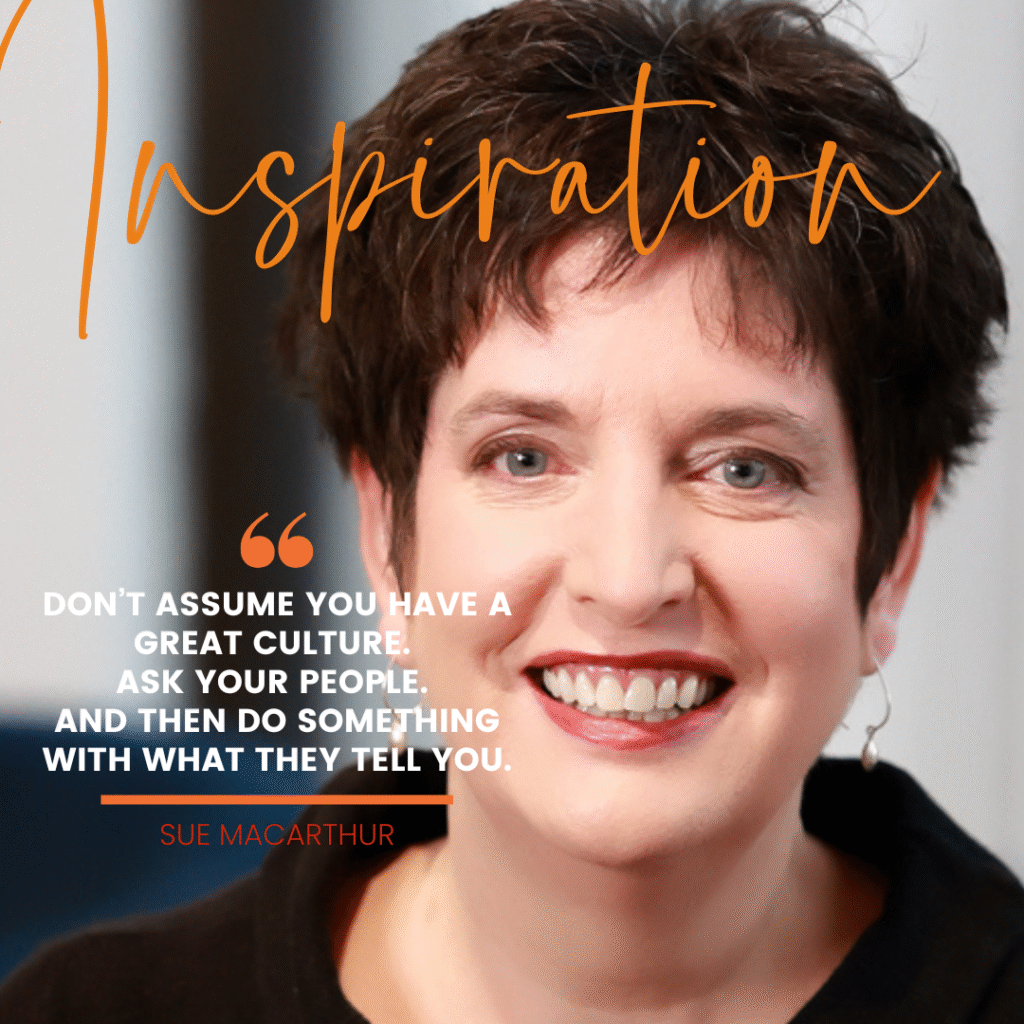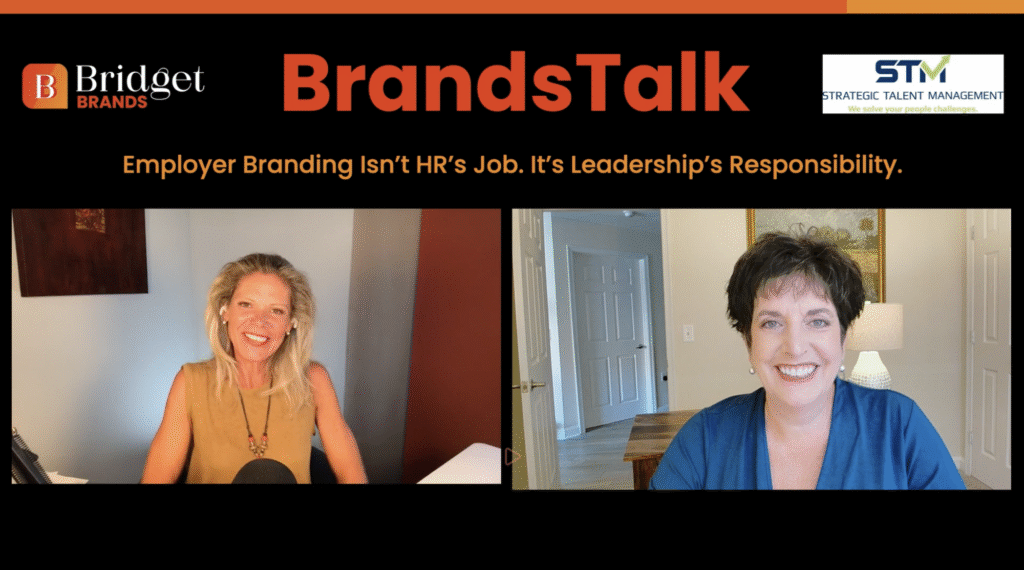
BRANDSTALK #161
Sue MacArthur
PRESIDENT
STRATEGIC TALENT MANAGEMENT
Your brand isn’t what you sell. It’s how people feel about working for you.
If that line made you pause, good. Because too many companies still believe employer branding is a nice-to-have HR function—something handled by recruitment campaigns, ping-pong tables, or a polished “Careers” page. That belief is not only outdated—it’s costing companies their best talent, their reputation, and ultimately, their growth.
Here’s the truth: Employer branding is leadership’s job. It’s a cultural commitment, not a marketing exercise. And in 2025, if leaders don’t own it, they’ll lose the war for talent and the trust of their customers.
In my recent conversation on BrandsTalk with Sue MacArthur, President of Strategic Talent Management, we pulled back the curtain on employer branding. With 35+ years in operations, HR, and leadership—and as the host of People Solutions and the new podcast Get On With It—Sue knows the people side of business better than most.
Together, we uncovered why employer branding is non-negotiable today, how leaders often sabotage it without realizing, and what organizations can do to align their culture with their external brand promise.
Why Employer Branding Matters More Than Ever
Let’s start with some context:
- According to LinkedIn’s Global Talent Trends 2024, 75% of job seekers consider an employer’s brand before even applying.
- Deloitte’s 2024 Human Capital Report found that companies with a strong employer brand see 50% more qualified applicants and a 28% reduction in turnover.
- Gallup research shows that 70% of an employee’s engagement is directly tied to leadership behavior—proof that leaders shape the employer brand far more than HR campaigns ever could.
In other words, if your culture is broken inside, no amount of glossy branding outside will save you.
As Sue put it during our conversation:
“The competition for top talent is fierce. Companies polish their consumer brand but neglect their employer brand—and the two should be inseparable.”
The Disconnect That Kills Employer Brands
Sue shared a powerful story about a small college with a stellar reputation for education—but a toxic reputation as an employer. Parents raved about sending their children there as students, but warned against working there as faculty. Over time, this internal disconnect eroded both its ability to recruit talent and its external brand as an educational leader.
The lesson? Your employer brand and your consumer brand are the same coin. Neglect one, and the other crumbles.
Here’s the uncomfortable truth:
- Leaders often believe their culture is better than it really is.
- Employees are brand ambassadors—whether you like it or not. What they say at a dinner party about working for you will either fuel or fracture your reputation.
- Employer branding isn’t built in HR reports—it’s lived in everyday interactions.
Leadership’s Role: Living the Brand
Employer branding starts and ends with leadership. Sue shared an example of a business owner who proudly marketed his company as a “Best Place to Work.” But when new hires shared their actual experiences, the culture didn’t match the branding. The fix wasn’t a flashy HR campaign—it was leadership listening and making small but powerful adjustments:
- More flexible work hours
- Expanded paid time off
- Transparency and responsiveness
The result? A culture shift that re-energized employees and boosted morale.
As Sue bluntly put it:
“Don’t assume you have a great culture. Ask your people. And then do something with what they tell you.”
Generational Shifts: Why Culture Can’t Be Ignored
Another theme that emerged: younger generations are rewriting the rules of work. Gen Z and Millennials don’t just want paychecks—they want:
- Work-life integration, not “balance.” They expect flexibility to be present at family events and still thrive at work.
- Meaningful contribution. They want to know their work matters—to the company and to the world.
- Transparency and inclusion. Leaders who don’t ask for input and act on it will lose their trust—and their loyalty.
As I reflected in the episode: when employees see their uniqueness valued and their contributions appreciated, they become more than workers—they become brand advocates.
Startups: The Critical “Employee 11”
Sue dropped a fascinating insight: in startups, the first ten hires usually come from the founder’s personal network. But around employee number 11, companies must bring in their first “stranger.” That’s where culture cracks often appear.
If culture hasn’t been defined vision, mission, values, behaviors, this hire often fails. Why? Because skills can be taught, but cultural fit can’t.
For startups, especially, the employer brand is the glue that holds the early team together and fuels scalability. Without it, even the most innovative product won’t save the company.
Employer Branding Truths: Golden Nuggets
Here are the bullet points of truth and advice Sue shared that every leader needs to hear:
- Employer branding is not HR’s job—it’s leadership’s responsibility.
- Your consumer brand and employer brand are inseparable. Ignore one, damage both.
- Don’t assume your culture is healthy. Ask your employees. Use surveys, feedback loops, and act on what you hear.
- Employees are your most powerful brand ambassadors. What they say about working for you shapes customer trust.
- Generations are demanding work-life integration, meaning, and transparency. Ignore this, and you’ll lose them.
- In startups, culture is everything. Define it early or risk failure when hiring outside your immediate circle.
- Small changes matter. Flex time, appreciation, and inclusion can transform morale.
- Employer branding is not a campaign—it’s culture in motion.
Personal Branding, Leadership, and Alignment
Toward the end of our conversation, Sue and I explored the intersection of employer branding and personal branding. Her insight:
“Whether it’s your personal brand, company brand, or employer brand—it all comes down to motivation and core values. What gets you out of bed in the morning?”
This is where leaders must take ownership. Your personal brand as a leader cannot contradict your company’s employer brand. If you preach collaboration but lead through command-and-control, employees will see the truth and so will customers.
Alignment is the secret. When leaders live their values, employees embody them, and customers believe them. That’s the chain reaction of authentic branding.
Employer Branding Will Make or Break You
Let’s be blunt:
- A toxic culture can’t be hidden behind marketing.
- Employer branding isn’t about perks—it’s about purpose, leadership, and integrity.
- Leaders who neglect it will pay the price in disengaged employees, bad Glassdoor reviews, and declining customer trust.
But leaders who embrace it? They build organizations where employees want to work, where customers want to buy, and where brand reputation becomes unstoppable.
Remember: Employer Branding Isn’t HR’s Job—It’s Leadership’s Responsibility. And if you’re not leading it, you’re losing it.
🔗 Tune into this episode on all major podcast platforms! Apple Podcasts, Spotify, Amazon Music, Google Podcasts, etc…

📹 Watch us Live
Get in touch with Sue Mac Arthur:
Time Markers:
00:34 Meet Sue MacArthur
01:40 The Importance of Employer Branding
02:31 Leadership’s Role in Employer Branding
02:39 Real-Life Examples of Employer Branding
09:48 Employee Feedback and Its Impact
12:11 Generational Differences in the Workplace
20:30 Challenges in Startups and Employer Branding
27:06 Sue’s New Podcast and Personal Branding




